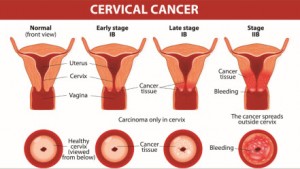
Cervix is the most susceptible site of cancer in women in the developing world. Cervical cancer is one of the most common cancers among women the world over and India has the largest burden of cervical cancer patients in the world. In India, this is ranked as the second-most common cancer among women (breast cancer being the most common), but in certain parts of the country , it is still the most common cancer among women the world over and India has the largest burden of cervical cancer patients in the world. In India, this is ranked as the second-most common cancer among women
Screening for cervical cancer is the most effective method of detecting it at an earlier asymptomatic stage. Screening aims to reduce the number of women who die from this condition as it provides an opportunity for early diagnosis and treatment. This is particularly relevant in India where cervical cancer is mostly detected when the symptoms of advanced stage appear.

The conventional PAP test has been the mainstay of cervical cancer screening. More accurate interpretations of cervical cancer precursors have been achieved by using new liquid-based cervical cytological smear technology . The HPV (human papilloma virus) test finds certain infections that can lead to cell changes and cancer. Regular cervical screening offers the best protection against developing cervical cancer.
Cervical screening aims to screen all women between the ages of 25 and 64 years. A three-yearly screening for the age group between 25 and 49 years and a five yearly screening between the age group 50 and 64 years is recommended. Women who have had a total hysterectomy to treat cancer or who had cervical intra-epithelial neoplasia (a type of change in cervical cells that can lead to cancer) at the time of having a total hysterectomy , may need another type of test called a vault smear (sample of cells are taken from the vagina, close to where the cervix used to be).
Women should be made aware of the benefits of undergoing regular cervical screening tests and should be offered the same.
Women at 65 and above years of age should undergo screening only if they haven’t been screened since the age of 50 years or if they recently had abnormal tests. Women aged 65 and over whose last three test results were normal do not require further cervical screening tests. As the risk of cervical cancer is very low in women who have never had sex, women in this category may opt not to have cervical screening. Cervical screening tests are not usually recommended in pregnancy . After giving birth, women should wait until three months before having a screening test.
Women who have had total hysterectomy (an operation that involves complete removal of the womb and cervix) do not require cervical screening. However, women who have had a hysterectomy with part or all of the cervix left “in place” will need screening.
For more information of Cervical Cancer Treatment in India, please visit this link :
https://safemedtrip.com/medical-services/cancer-treatment-in-india/cervical-cancer-treatment-in-india.html

 Click to WhatsApp
Click to WhatsApp +91-9899993637
+91-9899993637



